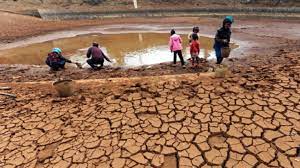Week FOUR of RI’s Month of Water, Sanitation & Hygiene (WASH).
Nobody takes water for granted in Zimbabwe, least of all the residents of Musekiwa and Mushaki. Located about 160 kilometers (99 miles) from the capital of Harare, the two villages have been drastically affected by the country’s water shortage. Until recently, many residents walked five kilometers (three miles) or more to find water every day. “They were getting some water from open wells, some from rivers,” says Trymore Tafadzwa Kabanda, a counselor for Mushaki. That changed when two Rotary clubs thousands of miles apart decided to collaborate on a grant-funded project. Members of the Rotary Club of Saint Helena, California, USA, learned about the villages’ situation in 2020 from a guest speaker whose wife had grown up in the area. They found out about the devastating effects climate change has had on rainfall in rural Zimbabwe, where more than 90% of households depend on agriculture for their main livelihood. “They had a horrendous water problem,” says John Muhlner, a past president of the Saint Helena club. “Women, for the most part, were walking miles every day to bring water back to their homes. Often, they would go and wouldn’t find water, or maybe the water they found would be contaminated.”
The Saint Helena Rotarians contacted the Rotary Club of Harare CBD, Harare, Zimbabwe, which conducted a community assessment. After that, the clubs raised funds and applied for a Rotary Foundation Global Grant. The US$82,000 project plan was to dig two wells, install solar-powered pumps and a water piping system, train residents to maintain the equipment, and conduct an educational campaign about the importance of hygiene….“Water touches on all of Rotary’s areas of focus,” says Mary Beth Growney Selene, chair of the Water, Sanitation, and Hygiene Rotary Action Group. “Children are not being pulled away from school to go fetch water in a local river. Parents don’t have to spend time fetching water, so they can be more productive economically. People aren’t as susceptible to waterborne diseases. ‘It all starts with water,’ is what we say.” That was certainly the case in Mushaki and Musekiwa. “Now, most of the villagers don’t have to go more than a few meters to fetch water,” Kabanda says. “Also, diseases like cholera are prevented.”
Source [https://www.rotary.org/en/value-well]
Submitted by: Christopher W Knapp, District 6000 Foundation Chair
#ServiceAboveSelf #Rotary #rotaryinternational
